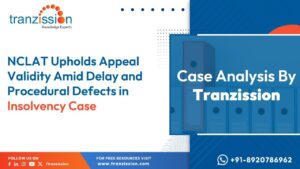
Duties of an Insolvency Professional

Table of Contents
In the rapidly changing landscape of modernization and technology, many companies face challenges related to their financial stability. An Insolvency Professional is crucial in managing these challenges under the Insolvency and Bankruptcy Code (IBC) of 2016 in India. Their primary focus is on the revival and restructuring of financially distressed companies. This blog explores the key roles and functions of insolvency Professionals in detail.
The Appointment Process of a Resolution Professional
Appointing an insolvency professional is a critical step that ensures transparency and efficiency within the organization. Initially, an insolvency professional (IP) is appointed as interim resolution professional (IRP). Upon deliberation by the committee of creditors (CoC), the interim resolution professional is confirmed as Resolution Profession (RP) or a new Insolvency professional is appointed as RP typically within 30 days, a timeframe that adds to the complexity and urgency of the selection process.
Roles & Responsibilities of a Resolution Professional (RP)
Upon appointment, the IRP/RP conducts detailed analyses using existing data to identify operational weaknesses and areas for immediate improvement. Their main responsibility is to manage the debtor’s operations effectively to safeguard assets. The RP also facilitates meetings with the CoC to discuss claims collection against the company. Their duties include monitoring all company assets and overseeing operations to ensure optimal workflow until a resolution professional is appointed. They are tasked with reviewing financial statements to manage and take custody of the company’s assets.
Decision Making by the Committee of Creditors (CoC)
The CoC, composed of financial creditors, plays a pivotal role in the insolvency resolution
process. They are responsible for deciding whether to retain an existing IRP or appoint a new, more qualified professional. The effectiveness of the insolvency proceedings is significantly influenced by these decisions, which aim to protect stakeholders’ interests and enhance company profitability.
Timeline for Appointment
Addressing insolvency swiftly is crucial; thus, the appointment of an IRP is strictly regulated to to be appointed on insolvency petition being accepted. This rapid timeline ensures that a competent professional is in place to manage the company’s assets effectively. Following the appointment, the CoC, in their first meeting, decides whether to continue with the current IRP or appoint a new resolution professional. Adhering to these timelines is essential to prevent further deterioration of the company’s assets and to secure a positive outcome from the insolvency proceedings. This fast-paced transition from IRP to RP is designed to maintain momentum and safeguard the company’s assets without delay.
Who are Insolvency Professionals?
Insolvency Professionals (IPs) play a critical role in managing insolvency for individuals, companies, LLPs, and partnerships by liquidating assets and facilitating settlement processes. This career merges expertise in finance and law, offering professionals exposure to varied insolvency cases and the opportunity to enhance their skills. To qualify as an IRP, one must be an Indian citizen, at least 18 years old, and meet specific hiring body requirements, including passing the National Insolvency Examination. Their responsibilities include evaluating a company’s financial health and devising strategies to improve it.
Additionally, Tranzission offers recorded lectures that can serve as valuable resources for individuals aiming to become insolvency professionals. These lectures likely cover essential topics related to insolvency laws, financial assessments, and strategies for resolving insolvency cases.
The Demand for Skilled IPs
There is a growing demand for skilled IPs due to the complexity of tasks they handle, which include financial management, legal assessments, asset valuation, and business restructuring. As companies increasingly rely on IPs to manage these tasks, they prefer candidates who possess strong problem-solving abilities, commercial insight, and relevant experience. The rise in business failures has further heightened the need for competent IPs, making it a promising career path for professionals looking to engage in challenging work environments.
The Role of IPs in the Financial Ecosystem
IPs are pivotal in the financial ecosystem, tasked with debt recovery and overseeing the liquidation process within government regulations. Their role is crucial in managing asset sales meticulously and ensuring all procedures comply with legal standards, thereby mitigating the adverse effects of insolvency on the company.
Impact and Influence of IPs on the Industry
IPs have a significant impact on the industry by developing and implementing strategies that enhance both the economic and legal frameworks of a company. They prepare resolution plans, convene stakeholder meetings to discuss these strategies, and oversee their implementation to transform the company’s approach to insolvency.
Limitations on the Resolution Professional
While Resolution Professionals (RPs) are integral to the insolvency process, their authority is inherently limited to ensure transparency and fairness in their dealings with stakeholders. They require approval from the Committee of Creditors (CoC) for critical decisions involving contract formulations, asset sales, and other significant actions. This oversight is crucial to maintain neutrality and prevent any conflicts of interest or power misuse, safeguarding the interests of all parties involved.
Judicial Pronouncements and Their Impact on RPs
Judicial pronouncements significantly define the scope of authority for Resolution Professionals (RPs). Courts often intervene to delineate the rights and limitations of RPs, particularly when creditors and other parties contest their decisions. These judicial decisions are crucial as they establish the boundaries within which RPs can operate, ensuring their actions remain within legal confines. For instance, courts have specified the extent to which RPs can accept or reject claims and have placed restrictions on their decision-making capabilities during asset sales. Such pronouncements are vital for maintaining fairness among all stakeholders involved in the insolvency process.
Operating Framework for RPs
The operational framework for RPs is shaped by a combination of judicial pronouncements, regulatory restrictions, and approval requirements. This structure underscores the dual responsibilities of RPs: managing the insolvency proceedings efficiently while ensuring transparency and equity throughout the process.
Training for Aspiring IPs
For those looking to enter the field, various comprehensive training programs are available that cater to the demands of aspiring Insolvency Professionals (IPs). These programs offer valuable exposure to real-world situations and interactions with seasoned professionals. Among the offerings, courses like SureShot IPs are particularly notable for their thorough coverage of the IBBI-prescribed syllabus. These courses utilize case studies and practical scenarios to teach both fundamental and intricate aspects of insolvency, making them highly beneficial for aspirants seeking to understand complex real-world insolvency situations.
Conclusion
Skilled IPs are pivotal for companies navigating complex and financially distressed situations. While the primary role of an IP is not just to rescue businesses from bankruptcy, they are instrumental in managing orderly insolvencies. This contributes significantly to sustaining a healthy economic environment. The constant presence of financial uncertainties ensures the persistent demand for experienced and well-trained IRPs in the economic marketplace. Companies rely on these professionals to uphold the integrity and stability of their operations, underlining the importance of this role in maintaining a robust business ecosystem.
As previously mentioned in this blog, the growth in the number of companies and individuals ensures that economic fluctuations will persist, continuously fueling the demand for insolvency professionals within the industry. These Insolvency Professionals are not only tasked with managing crises but also play a crucial role in shaping and directly influencing the frameworks that govern company operations.





